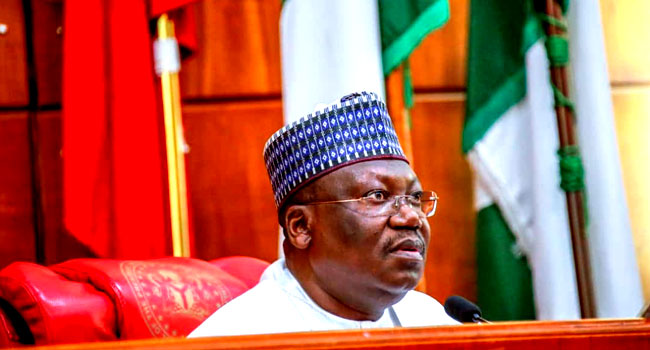Democracy thrives on the principle of checks and balances. This is precisely why democracy is built on the independence of the three equal arms, namely Executive, Legislature and Judiciary!
It is principally the Legislature, that is NASS and the State Assemblies that perform the main check and balance function on the executive. It is the legislature that performs oversight on the executive.
How can the Legislature do this when it allows the Executive, a clearly distinct arm to decide its leaders? How can a legislature leadership appointed by the executive check the executive?
Ideally, the Legislature at all levels should select the best among themselves in line with the Rules of the Legislature and the tenets of the constitution.
For the executive to dabble into the fray is a first wrong step by the yet to be sworn in Tinubu. It will be a mistake to try to transfer state politics where governors handpick Assembly principal officers to the national level.
Expectedly, many Nigerians are up in arms against those endorsements! Not only in principle but also in terms of the zones favoured.
“History does not repeat itself; it is we who repeat it,” wrote Filipino historian Ambeth Ocampo. It was the Filipino historian’s famous quote that came to my mind when I read media reports that the president-elect, Bola Ahmed Tinubu, and governors on the platform of the All Progressives Congress (APC) have ended the speculations about the leadership of the 10th National Assembly.
According to the report as also reported by this newspaper, Tinubu and the APC governors have endorsed former minister of Niger Delta Affairs, Senator Godswill Akpabio, as the next president of the Senate. Similarly, it was learnt that Senator Barau Jibrin, was picked as deputy president of the Senate.
It was also reported that the members-elect of the 10th National Assembly further told this paper that Tajudeen Abbass, representing Zaria federal constituency of Kaduna State (North West) also received the blessing of Tinubu as the Speaker of the House of Representatives of the 10th Assembly. The position of the deputy Speaker of the House of Representatives was given to the outgoing spokesman of the 9th Assembly, Benjamin Kalu, who represents Bende federal constituency of Abia State.
These endorsements are not exactly in the best traditions of democracy because of its implications for collusion against the public good.
Expectedly, not everyone is happy with the announced executive endorsements. Serving senators and senators-elect from the South-east opened the salvo by rejecting the zoning of senate presidency to the South-south region as well as the choice of Godswill Akpabio for the position.
The 11 south-east senators and senators-elect, who signed the communique, said accepting Akpabio as senate president amounts to marginalising the people of the South-east geopolitical zone of the country.
They urged Bola Ahmed Tinubu to drop Godswill Akpabio and stop the politics of marginalisation and endorse a candidate from the South-east as the next senate president on the ground that the region had been denied the presidency of the country since 1966.
Recall that barely one week after the National Assembly elections, and with the Independent National Electoral Commission (INEC) yet to issue certificates of return to winners, the race for principal offices, particularly, the position of Senate President in the upper chamber, had begun. It was speculated in the media then that the incumbent President of the Senate, Ahmad Lawan, and some of the senators-elect, like Orji Uzor Kalu, Barau Jibrin, Godswill Akpabio, Adams Oshiomhole, Abdul-Aziz Yari and Dave Umahi, had started subtle campaigns among their colleagues. At the time it was obvious that the choice of the next senate president would largely depend on the zoning of the office, among other principal offices, by the leadership of the ruling All Progressives Congress (APC) and Tinubu. But is it the right thing for the executive and the leadership of the APC to determine for the legislature, another arm of the government, its leadership in a democracy?
This tendency for the executive to determine the leadership of the legislature erodes the principle of separation of powers. The separation of powers is a constitutional principle introduced to ensure that the three major institutions of the state namely; the legislative, the executive and the judiciary are not concentrated in any single body whether in functions, personnel or powers.
Separation of powers therefore refers to the division of responsibilities into distinct branches to limit any one branch from exercising the core functions of another. The purposive and teleological intent of the doctrine of separation of powers is to prevent the concentration of untrammeled and unchecked power by providing for “checks” and balances” to avoid autocracy, over-reaching by one branch over another, and the attending efficiency of governing by one actor without need for negotiation and compromise with any other. The separation of powers interacts with both the rule of law and the supremacy of the constitution; and the independence of the judiciary ensures that the executive will be kept within the legal powers conferred by the constitution, and thus, simultaneously upholding the rule of law and constitutional supremacy.
The 1999 Constitution of the Federal Republic of Nigeria made separation of powers a fundamental principle of governance. The 1999 Constitution in different sections vested the powers of government in separate organs of government as follows: Section 4 deals with the Legislative powers; section 5 deals with Executive powers, while section 6 is concerned with judicial powers. This kind of separation of powers is known as the horizontal separation of powers. There is no gainsaying the fact that a government of separated powers is less likely to be tyrannical and more likely to follow the rule of law. A separation of power can also make a political system more democratic. The division of powers also prevents one branch of government from dominating the others or dictating the laws to the public.
Throughout our recent political history, especially since 1999, the executive has always tried to interfere in the leadership selection of the National Assembly. This has been at the detriment of good governance. Who would forget how the former President Olusegun Obasanjo’s interference in the leadership of the National Assembly led to the Senate producing five senate presidents in eight years. The volatility in Senate leadership at the time affected the development of the country. Thank God the senators at the time finally came to their senses towards the twilight of the administration and was able to muster the legislative courage to stop the Third Term Bid of President Obasanjo.
When the APC defeated the incumbent PDP administration in 2015 and General Muhammadu Buhari emerged the president of the country, he said publicly that he does not want to interfere in National Assembly leadership selection. While he declared noninterference in public, there were however indications that they had preferred candidates for Senate President and House of Representatives Speaker. In the end, the former governor of Kwara State Senator Bukola Saraki outsmarted the APC leadership and in alliance with the opposition PDP’s Senator Ike Ekweremadu emerged Senate President and Deputy Senate President respectively. The APC to this day has not forgiven Saraki and Ekweremadu and many believed that it may have been the main reason why the federal government literarily abandoned Ekweremadu on his travails over organ harvesting charges in United Kingdom for which he has been sentenced to 10 years imprisonment. Beyond that, the relationship between the Senate under Saraki’s leadership and the executive led by Buhari was cantankerous to say the least.
Having learnt lesson from the Saraki leadership of the Senate, in his second term President Buhari ensured stability in National Assembly by ensuring that their preferred candidates, Senator Ahmad Lawan and Hon Femi Gbajabiamila emerged Senate President and Speaker of the House of Representatives respectively. The executive and the legislature in turn has cozy relationship that left a lot to be desired. Many Nigerians concluded that the National Assembly leadership under Ahmad Lawan is a rubber stamp, a judgement that reflects the public’s perception because the executive seems to get everything it wants from the legislature without much scrutiny.
The 9th National Assembly watched helplessly while the nation’s foreign debt ballooned from $10billion in 2015 when Buhari became president to $40billion by October, 2022. This debt overhang and so many other activities of the executive that the National Assembly leadership tolerated are the price a nation pays when the legislature is not allowed to determine its leadership because of executive interference.
This column does not support such interference because it is at the detriment of citizen welfare.
MAY NIGERIA REBOUND











